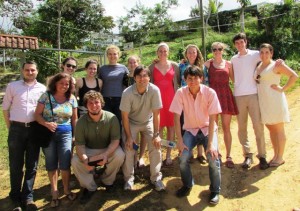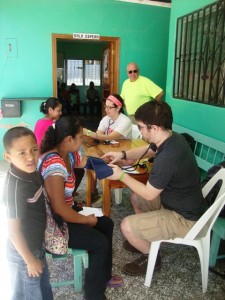Composting to create rich soil, building barbed wire fences, and creating spaces to allow horses to be free-range animals were just a few of the ways Lara Ruggerio ’15 (Haddonfield, N.J.) spent her winter break in Costa Rica.

The Costa Rica team at the La Gran Vista Agricultural Farm
Through Lafayette’s Alternative School Break (ASB) Club, Ruggerio led a team of 11 students and two faculty members who lived and worked on an entirely self-sustaining farm in Costa Rica. The group’s focus was on sustainable agriculture, working under the direction of an environmental engineer.
Ruggerio and her team lived with the family who owned the farm during their stay. They spent time with the father, who was responsible for the farming and agricultural aspects of the farm, and also took turns working with his wife to prepare and serve meals and clean.
“Through this trip, I believe that each of the members of our team was able to develop new ideas and see firsthand how sustainability can be applied,” says Ruggerio, a neuroscience major. “As much as we could learn in a classroom, it is not until you see the process of biogas production and then use that biogas to work together to make meals each night on the stove that sustainability really becomes ‘real.’”
Organized through the Landis Community Outreach Center, this is the 20th year that ASB students have traveled throughout the U.S. and abroad for community service projects. During winter break, students also traveled to Honduras and Texas. Over spring break, teams served in New Jersey, Kentucky, and North Carolina.
Psychology major Alana Siegel ’13 (Woodbury, N.Y.) led the team that traveled to Honduras. The group worked with the Central American Relief Efforts organization to set up and work in four health clinics in rural southern Honduras. Each day the volunteers traveled to a different village, took patients’ blood pressures, and worked in the pharmacy to gather the medicines that the doctor prescribed. They served 1,200 people in four days.

Students take blood pressure readings in Duyure, Honduras
“These are people who probably will not have access to a doctor or pharmaceuticals until the next time this clinic comes around,” she says.”
According to Siegel, the trip was eye opening for a number of reasons, including the apparent effects of globalization.
“Major soda companies have ads painted all over even in the most impoverished and remote towns,” says Siegel. “According to a local, the soda companies convinced the villagers that the water was bad to drink, while at the same time making the soda cheaper than bottled water. What resulted was thousands of people with rotting teeth due to drinking soda as the main source of liquid.”
Two years ago, Siegel traveled to Ecuador with ASB to address issues of sustainable development and three years ago she went to Alabama, Tennessee, and Georgia to address ongoing civil rights issues.
“The experiences of an ASB trip are undoubtedly transformational and maturing,” she says. “ASB breaks down any barriers between you and other populations in our country and world, fostering a deeper understanding of people and a better method of interacting with them every day. ASB has taught me that community service goes beyond working for the community, and amounts to working with other people from other walks of life, all on the same level.”

